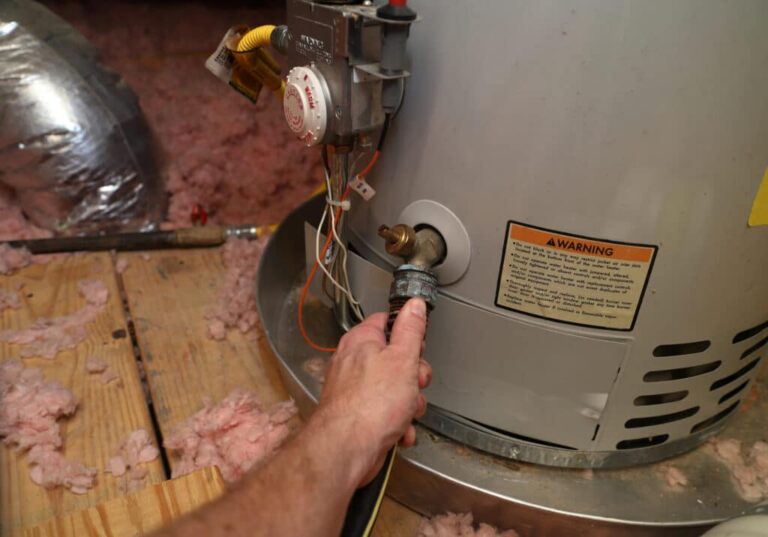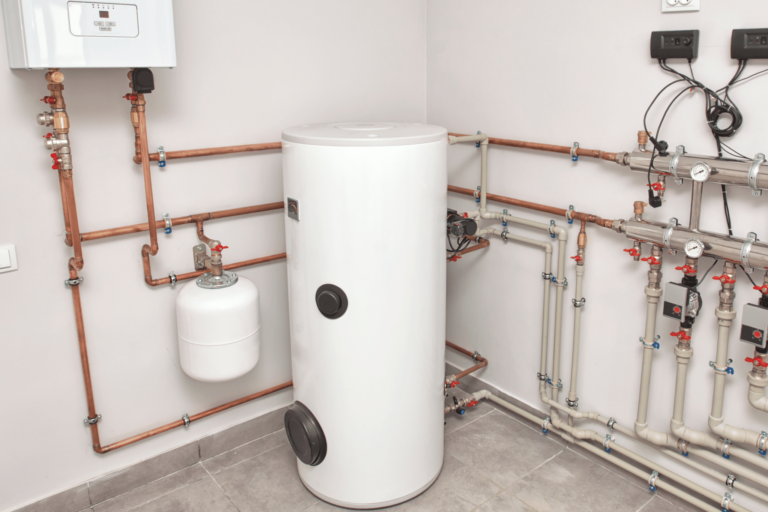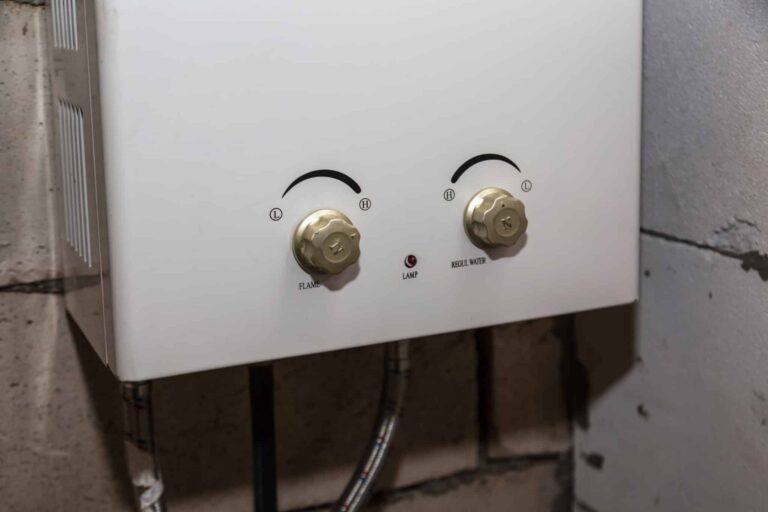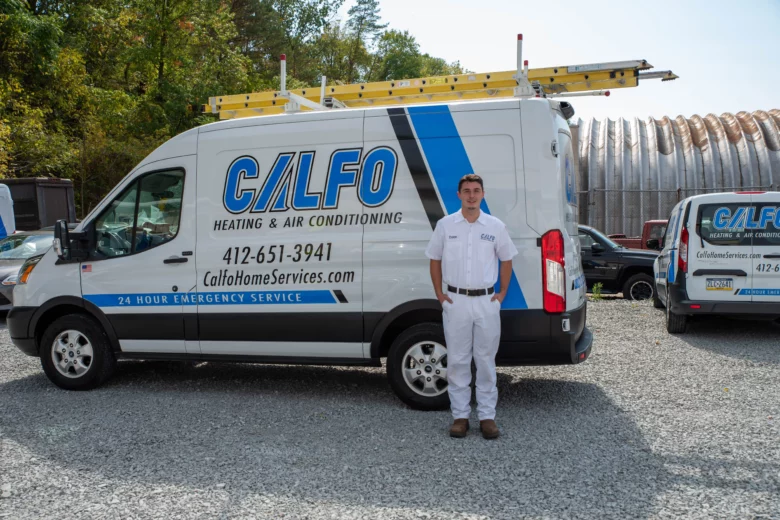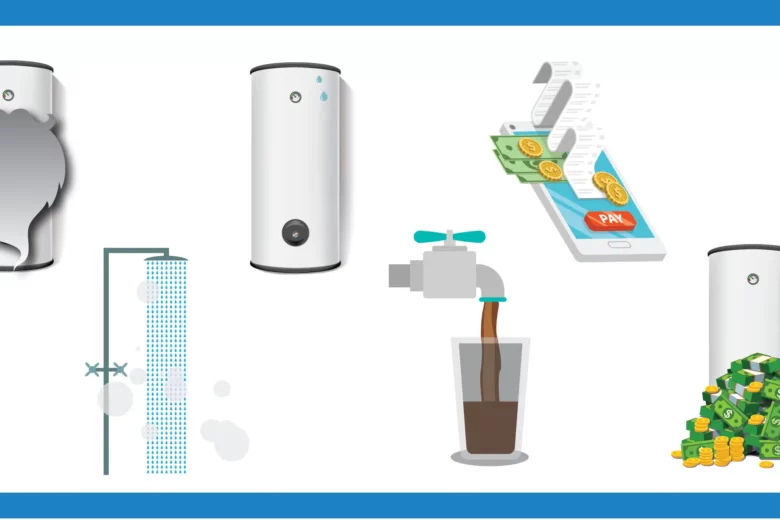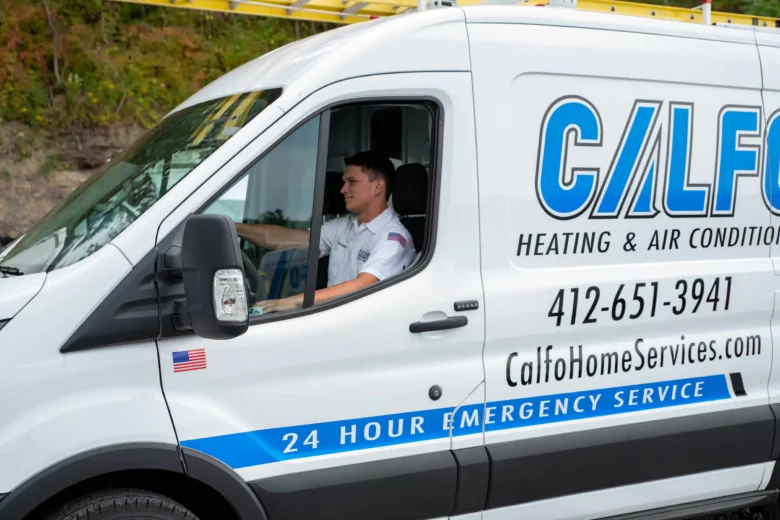18 Months No Interest on a New Water Heater
Up to $650 in Utility Rebates for Installations
Whole-Home Plumbing Inspection for $79.99
Pittsburgh Tankless Water Heater Install Pros Who Get the Job Done Right
If you need to install a tankless water heater, you want a team of pros you can trust. At Calfo, that’s exactly what we offer. We believe that no job is complete unless it’s done correctly, so we’ll never rush or cut corners during a tankless water heater installation. Plus, all of our techs are trained with over 10,000 hours of on-the-job experience, so no matter what comes up during the installation, you can rest assured that our qualified team of pros can handle it.
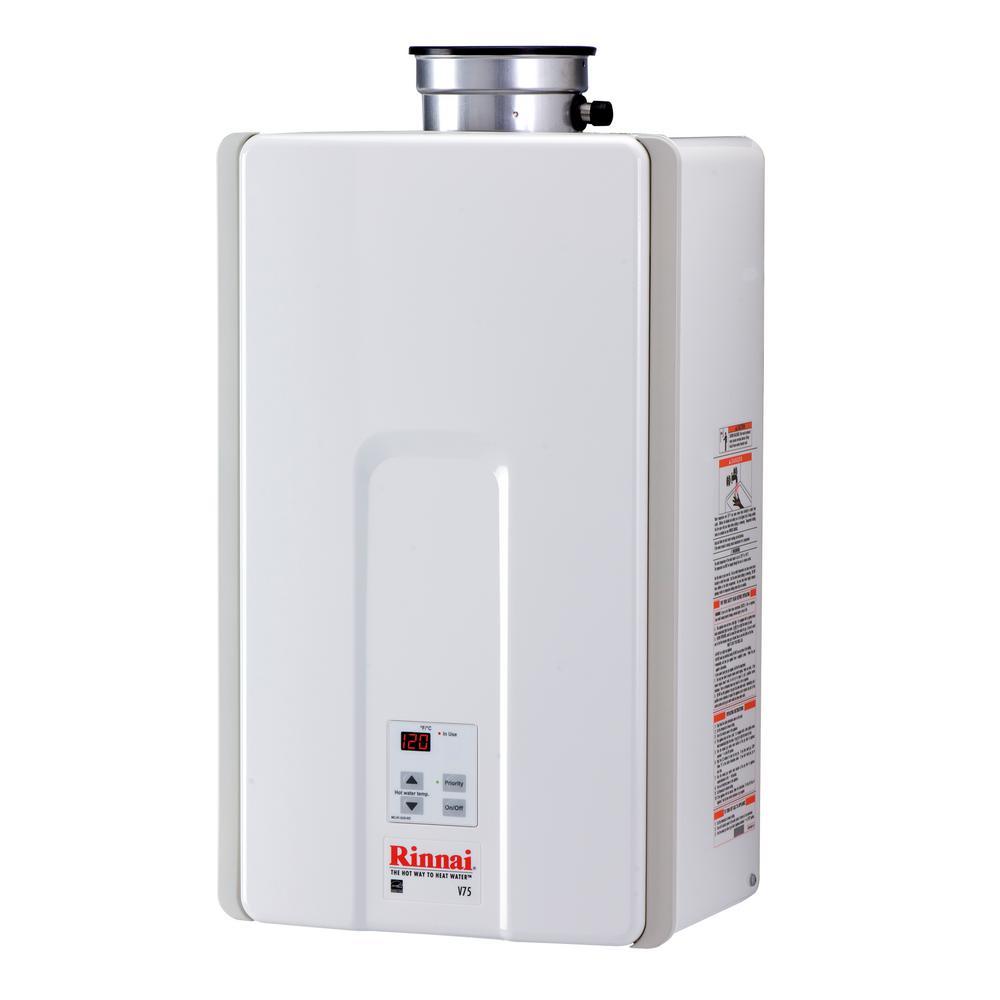
How it works
Your tankless water heater installation in 3 simple steps
Ready to get your tankless water heater installed? Great! Call us at (412) 651-3941 or schedule an appointment online. We’re here for you 24/7, so whether your water heater fails at 2 am or 4 pm, we’re here.
2) Get an in-home consultation
The first step to installing your tankless water heater is to have one of our expert plumbers come to your home and help determine which water heater will be best for you. We’ll provide you with an upfront quote, and ensure you’re comfortable with the installation service before we begin.
Note: Unlike other companies who charge by the hour, we provide a solid quote before we begin any work. This way, you know exactly what you’ll pay, instead of worrying about hidden fees or sticker shock once the job is done.
3) Get your tankless water heater installed
Ready to get your water heater installed? We’re ready to get to work! We can usually install a tankless water heater in 1 day. On the day of your installation, our plumber will show up, install your water heater and clean up the space. At Calfo, we promise 100% satisfaction, so if you’re not happy with your water heater, let us know and we’ll make it right.
Average time to install a tankless water heater: 1 day
Price
Cost to install a tankless water heater in Pittsburgh
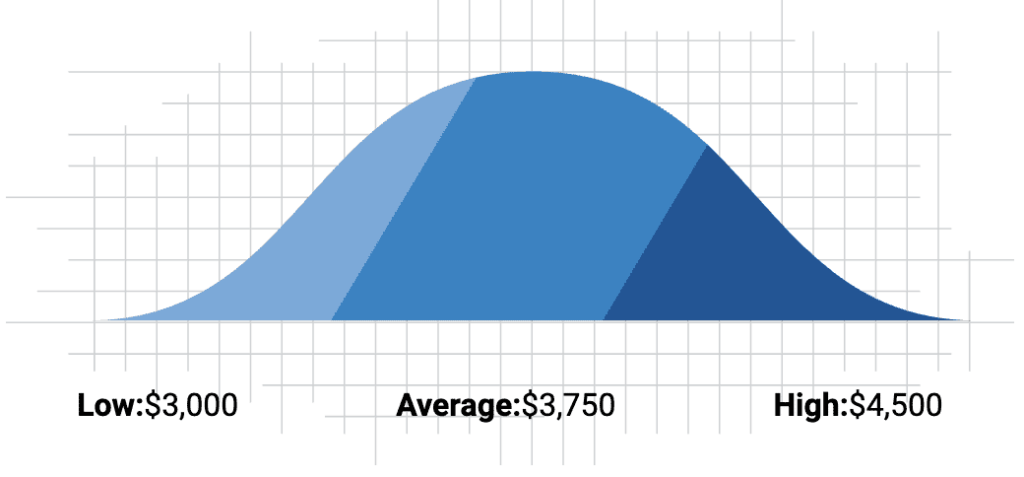
Price factors:
- Type of unit – There are two “types” of tankless water heaters: whole-home and point-of-use. Whole-home units heat up water for all plumbing appliances in your home whereas point-of-use units heat water for one specific appliance. Whole-home units are more expensive than point-of-use units. But, if you have a large home or household, you may need a whole-home unit AND one or more point-of-use units, which will increase the cost of your installation.
- Flow Rate – Flow rate is the number of gallons of water a tankless water heater can heat in 1 minute. The higher the flow rate, the more expensive the tankless water heater will be.
- Fuel Type – Gas water heaters cost more upfront than electric ones do, but gas is usually a cheaper form of fuel than electricity is, so you’ll likely see lower water heater costs with a gas water heater.
Want an accurate price?
Schedule an in-home diagnosis, which is FREE if we install your tankless water heater.
Financing
Financing options
- Service Finance
- Synchrony
Learn more about your options when talking to your service technician or one of our phone operators.
Payment options
- All major credit cards, including: Visa, MasterCard, American Express and Discover.
- Personal checks and cash
Our word is all we have to hang our hat on, and here at Calfo our word is as tough as steel. After your AC is repaired, we’ll follow up to make sure you’re happy with our work. If you aren’t, let us know. We’ll use all our might to make it right.
Guarantee
Solid Steel Guarantee
After your tankless water heater is installed, we’ll call you to make sure you’re happy with our work. If you aren’t, let us know. We’ll use all our might to make it right.
What are the differences between a traditional water heater and a tankless water heater?
Traditional water heaters and tankless water heaters differ primarily in their design, efficiency, and method of water heating. Here’s a closer look at these differences:
Storage vs. On-Demand Heating
- Traditional Water Heaters:
A conventional water heater, also known as a tank water heater, stores a set amount of hot water in a tank. Once the hot water is depleted, it takes time to heat more water. This can lead to waiting periods and potential inconveniences, especially for larger households with high hot water demands.
- Tankless Water Heaters:
Tankless models, as the name suggests, do not store hot water. Instead, they heat water on demand as it flows through the unit. As a result, you can enjoy a continuous supply of hot water without waiting times involved in reheating a tank.
Energy Efficiency of Tankless Water Heaters
- Traditional Water Heaters:
These heaters continually consume energy to keep water in the tank heated, even if it’s not being used. This standby heat loss can lead to higher utility bills over time.
- Tankless Water Heaters:
Since they operate only when hot water is needed, tankless units are generally more energy-efficient. They eliminate standby heat loss and can result in substantial savings on energy bills, particularly for households with average to high hot water demands.
Size and Space Requirements
- Traditional Water Heaters:
These units require significant floor space to accommodate the tank. They are usually bulky and need proper ventilation.
- Tankless Water Heaters:
Tankless systems are compact and can be mounted on walls, freeing up floor space. Their design allows for more flexible installation options, making them ideal for homes with limited space.
Lifespan and Maintenance
- Traditional Water Heaters:
Typically, a traditional tank heater lasts about 8 to 12 years before requiring replacement. Regular maintenance is necessary to prolong its lifespan.
- Tankless Water Heaters:
These systems generally have a longer lifespan, lasting up to 20 years or more. They also require less frequent maintenance, although descaling is recommended every few years to prevent mineral buildup.
Initial Cost vs. Long-Term Savings
- Traditional Water Heaters:
The initial cost tends to be lower, making traditional models more accessible. However, ongoing energy costs and the potential need for replacements can be higher over time.
- Tankless Water Heaters:
While the upfront costs may be higher, the energy savings and longer lifespan can result in lower overall costs in the long run, making them a worthwhile investment for many homeowners.
Ultimately, the choice between a traditional and a tankless water heater will depend on individual needs, budget considerations, and usage patterns. Pittsburgh homeowners are increasingly turning to tankless options for their efficiency and convenience, making this a smart choice for modern living. If you’re considering an upgrade, it’s worth consulting a professional to evaluate your specific needs and explore the best options for your home.
DIY vs. Professional Tankless Water Installation in Pittsburgh, PA
When it comes to installing a tankless water heater, homeowners often face the decision of whether to take a DIY approach or hire a professional. Each option has its merits and drawbacks, which are important to consider based on your skill level, the complexity of the installation, and safety requirements. Here’s a breakdown of DIY vs. professional installation:
DIY Tankless Water Heater Installation
Pros:
- Cost Savings: One of the primary reasons homeowners opt for DIY is to save on labor costs. If you’re handy and have experience with plumbing or electrical work, you can significantly reduce overall expenses.
- Control Over the Process: Handling the installation yourself means you can choose the timing and pace of the project without coordinating with a contractor’s schedule.
- Learning Opportunity: For those interested in home improvement, installing a tankless water heater can be a valuable learning experience.
Cons:
- Safety Risks: Tankless water heaters require careful handling of gas or electrical connections, which can pose safety hazards if not done correctly. Improper installation can lead to leaks, fire hazards, or even carbon monoxide poisoning.
- Lack of Expertise: If you’re not familiar with local building codes, you might inadvertently violate regulations, leading to potential fines or issues during home inspections.
- Time-Consuming: Even for experienced DIYers, the installation process can be more time-consuming than anticipated, especially if unexpected problems arise.
Professional Tankless Water Heater Installation
Pros:
- Expertise and Experience: Professional plumbers have the training and experience to handle the installation correctly. They are familiar with local codes and regulations, ensuring a compliant installation.
- Safety Assurance: Hiring professionals means that safety protocols are followed, reducing the risk of accidents or system failures that could occur with an amateur installation.
- Warranty Protection: Many manufacturers require professional installation to maintain warranties. By hiring a licensed technician, you ensure that your warranty remains valid in case of future issues.
- Time Efficiency: Professionals can complete the installation more quickly and efficiently, allowing you to enjoy hot water without unnecessary delays.
Cons:
- Higher Upfront Costs: The primary downside is the cost of labor, which can significantly increase the overall price of the installation compared to DIY.
- Scheduling Flexibility: You may need to work around the contractor’s availability, which could delay your project compared to doing it on your own schedule.
Choosing between DIY and professional installation for a tankless water heater ultimately depends on your confidence in your plumbing skills, adherence to safety standards, and your ability to comply with local regulations. While DIY can be a cost-effective option for those with the right skills, hiring a professional ensures safety, compliance, and expert installation, making it a worthy investment for most homeowners. If you’re considering the latter, reaching out to a trusted team like Calfo Home Services in Pittsburgh can provide the quality installation you need with peace of mind.
Is a Tankless Water Heater Right For Your Pittsburgh Home?
Deciding if a tankless water heater is the right choice for your Pittsburgh home involves considering several factors, including your hot water usage, home size, and specific heating needs. Here’s a breakdown to help you make an informed decision:
- Hot Water Demand
Evaluate your household’s hot water requirements. Tankless water heaters provide hot water on demand, meaning they don’t store hot water like traditional tanks. If your family has high demand for simultaneous hot water use (like multiple showers, laundry, and dishwashing), a tankless system can efficiently meet those needs without running out of hot water.
2. Home Size and Layout
Consider the size and layout of your home. If your home has multiple bathrooms, or extensive square footage, you may need multiple tankless units or a higher capacity model. However, for smaller homes or apartments with minimal hot water needs, a single tankless unit can suffice.
3. Energy Efficiency Goals
Tankless water heaters are known for their energy efficiency. If reducing your energy consumption and utility bills is a priority for you, switching to a tankless system could be beneficial. They generally use less energy compared to traditional models, as they only heat water when you need it.
4. Installation Space
Tankless water heaters are more compact than traditional systems, allowing for flexible installation in homes where space is at a premium. If you’re looking to free up space in your basement, garage, or utility room, a tankless model can be an excellent solution.
5. Local Climate Considerations
Pittsburgh experiences a range of temperatures throughout the year. In colder months, the incoming water temperature can affect the heater’s performance. Ensure that the model you choose is suitable for your area’s climate and can handle the necessary flow rate for your household during peak usage.
6. Budget for Initial Costs and Incentives
Tankless systems often require a higher upfront investment compared to traditional water heaters. If your budget allows for this initial cost and you are looking for long-term savings, it may be worth the investment. Additionally, check if there are local rebates or tax credits for upgrading to energy-efficient appliances that could help offset the cost.
7. Consultation with a Professional Plumber
Lastly, consulting with a licensed plumber familiar with Pittsburgh’s plumbing codes and local water quality can provide valuable insights. They can assess your home’s specific requirements and guide you toward the best tankless water heater options available in your area.
In summary, if your household has a consistent demand for hot water, values energy efficiency, and can accommodate the initial costs, a tankless water heater could be a highly beneficial addition to your Pittsburgh home.
Signs Your Tankless Water Heater Needs to be Replaced
Determining if your tankless water heater needs to be replaced can be based on several factors:
- Age of the Unit: Most tankless water heaters have a lifespan of around 15 to 20 years. If your unit is approaching or has surpassed this age, it may be time for a replacement.
- Reduced Performance: If you notice a significant drop in hot water availability or inconsistent temperatures, this could indicate wear or damage within the unit.
- Increased Energy Bills: A sudden spike in your energy bills can signal that your current model is working harder than necessary, possibly due to inefficiency or aging components.
- Visible Damage or Corrosion: Check for any visible signs of damage, leaks, or corrosion on the unit or piping. Physical deterioration can affect performance and safety.
- Error Codes: Most modern tankless units have digital displays that can show error codes. If you see persistent error messages that can’t be resolved, it might warrant replacement.
- Frequent Repairs: If you’re finding yourself repeatedly calling for repairs, it could be more economical to invest in a new unit rather than continue spending on fixes.
If you’re unsure or experiencing any of these issues, it’s advisable to consult with a licensed plumber. They can provide an expert evaluation and recommend whether a repair or replacement is the best course of action for your tankless water heater.
FAQ About Tankless Water Heater Installation in Pittsburgh, PA
What is a tankless water heater?
A tankless water heater, also known as an on-demand water heater, is a system that heats water directly without the need for a storage tank. It provides hot water instantly and continuously as it flows through the unit, ensuring you never run out of hot water.
How does a tankless water heater work?
When a hot water tap is turned on, cold water travels through a pipe to the unit. A gas burner or an electric element heats the water as it passes through the heater, providing a constant supply of hot water.
Are tankless water heaters energy efficient?
Yes, tankless water heaters are highly energy efficient. They only heat water as needed, which can lead to significant energy savings compared to traditional tank water heaters that continuously maintain a reservoir of hot water.
What are the benefits of using a tankless water heater?
- Endless hot water: You can enjoy hot water on demand without worrying about running out.
- Space-saving design: Tankless units are typically smaller and can be installed in various locations, freeing up space.
- Energy savings: Reduced energy consumption can lead to lower utility bills.
- Longevity: Tankless water heaters often have a longer lifespan than traditional water heaters, lasting up to 20 years with proper maintenance.
How much hot water can a tankless water heater provide?
The amount of hot water a tankless system can provide depends on its flow rate, typically measured in gallons per minute (GPM). It can deliver between 2 to 5 GPM, depending on the model and temperature settings.
Can a tankless water heater meet the hot water needs of my entire home?
Yes, with proper sizing and installation, a tankless water heater can meet the hot water demands of an entire home. For larger households or simultaneous use in multiple locations, multiple units may be installed or a larger system may be required.
Are tankless water heaters environmentally friendly?
Yes, tankless water heaters are considered environmentally friendly. Since they only heat water as needed, they consume less energy and reduce greenhouse gas emissions compared to traditional tank water heaters.
What are the installation requirements for a tankless water heater?
Installation may require modifications to your existing plumbing and electrical or gas systems. It’s best to consult a licensed plumber to assess your home’s specific requirements.
How much do tankless water heaters cost?
The initial cost of a tankless water heater can be higher than traditional models, including installation. However, the long-term energy savings and extended lifespan can make it a cost-effective choice over time.
Do tankless water heaters require maintenance?
Yes, regular maintenance is recommended to ensure optimal performance. This may include descaling to remove mineral buildup, checking filters, and inspecting connection
What are the different types of tankless water heaters?
The different types of tankless water heaters include:
- Whole-Home Tankless Water Heaters: These units are designed to provide hot water for all plumbing appliances throughout the entire home. They have a higher capacity and flow rate, making them suitable for larger households with multiple hot water needs.
- Point-of-Use Tankless Water Heaters: These are smaller units that heat water for a specific appliance or location in the home, such as a sink, shower, or dishwasher. Point-of-use units are typically less expensive and can be installed close to the appliance, providing instant hot water when needed.
Choosing between these two types will depend on the size of the home, the number of occupants, and specific hot water usage requirements.
Tankless water heater installation in Pittsburgh, PA, presents an efficient and eco-friendly solution for homeowners aiming to optimize their hot water usage. With benefits such as energy savings, endless hot water supply, and space efficiency, tankless systems cater to both small and large households. As you consider making the switch, it’s essential to engage with a licensed professional who can evaluate your specific needs and guide you through the installation process. Whether opting for a whole-home or point-of-use unit, investing in a tankless water heater can enhance your home’s comfort while contributing positively to the environment. Embrace the future of hot water solutions and explore how tankless technology can transform your household today!
We would recommend this company to anyone
We had a water heater installed…. the company was able to respond to us on the same day that we made the initial phone call and they followed up with an email that contained confirmation of a visit and also a picture and information on the individuals who would be entering our home. The initial salesperson was extremely polite and explain things to our satisfaction. The follow-up visit was made by the installation technician… who was also professional and polite…. and install the water heater and then explained warranties.
We would recommend this company to anyone who is in need of a water heater replacement.
Provided options based on my affordability
Very professional and informative about the issue I was facing with my water heater. Was honest about the cost and fees and Provided options based on my affordability.

